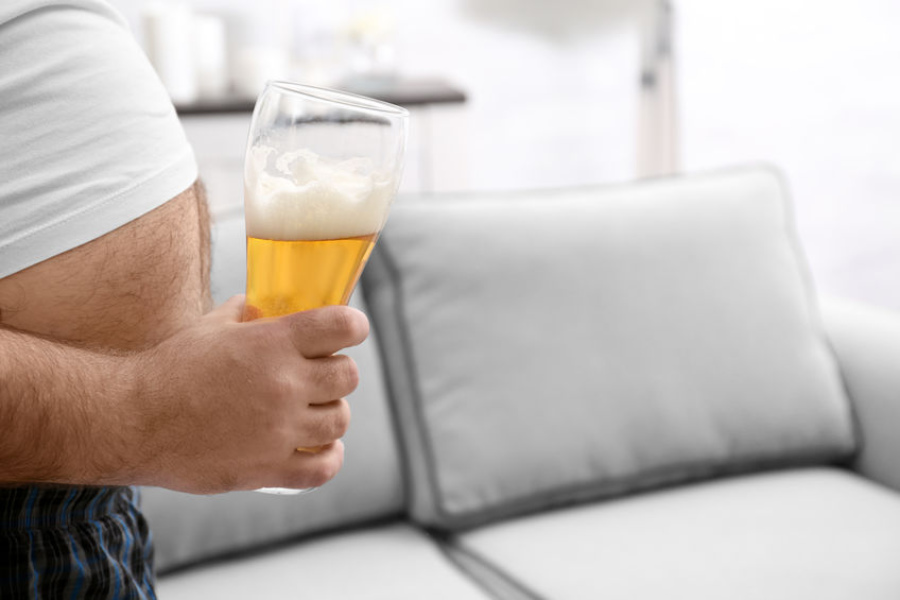How we all respond to alcohol is likely to be very individual but let’s explore it’s potential affects on your health and physique goals, as well as providing some ways to be more mindful and make better choices when it comes to alcohol consumption.
An overview of alcohol
Alcohol or more precisely ethanol is formed through the fermentation of plants. Typically, dense sources of carbohydrates such as wheat, rye, barley, corn and fruits have been used and this has been going on for centuries reaching all corners of the globe. Interestingly around 70% of those above the age of 18 drink alcohol.
Alcohol is absorbed readily in the gut, starting in the stomach and only slowed down by the presence of food. Once absorbed it goes to the liver where around 90% of it is metabolised. The by-products of ethanol metabolism are acetaldehyde and acetate, these are the by-products that can have a toxic effect on the body and often create nausea.
Alcohol is technically classed as a macronutrient and provides 7 calories per gram, but these calories are seen as empty as they offer little or no nutritional benefit to the body. Because we cannot store alcohol and because there is no function of alcohol in the body we must rely on our body to utilise the calories immediately. It will typically do this in preference of other calories consumed, and this can often be a reason for increased fat storage when consuming alcohol in a calorie excess state, not to mention the impact on food choices after a few drinks!
What impact does alcohol consumption have on your health?
Excessive alcohol intake is undoubtedly associated with a number of serious health and social problems; however some observational studies have indicated low to moderate alcohol intake may benefit health.
Observational studies that this data is typically extracted from are not concrete evidence of causation; they are interesting associations that have been noted that are yet to be studied on a more definitive basis. Unfortunately, randomised controlled studies are extremely hard to create when it comes to nutrition and lifestyle habits, thus we rely upon observational studies to make these types of claims. This is a major reason behind so many mixed messages about the risks or benefits of the food and drink that we consume, how is data extracted, who is extracting it, do they have ulterior motives?!
Observational studies have linked alcohol with the following:
Positive effects of alcohol
- Reduced risk of type 2 diabetes with low to moderate alcohol consumption.
- Reduced risk of osteoporosis with lower to moderate alcohol consumption.
- Reduced risk of cognitive decline and dementia.
- Reduced incidence of gallstones with lower to moderate alcohol consumption.
Negative effects of alcohol
Heavy alcohol consumption is associated with numerous health risks across the board including cancer, heart disease, bone health, type 2 diabetes, cognitive decline and general mortality risk, however even low to moderate amounts can cause complications in some individuals, such as:
- No safe alcohol consumption at any stage of pregnancy.
- More than 100 observational studies have shown a link between alcohol consumption and breast cancer with most of those studies finding an increased risk.
- Decreased growth hormone.
- Increases the conversion of testosterone to estrogen (aromatisation) and can be toxic to testicular health contributing to infertility and feminisation in men.
- Increased digestive symptoms:
- Suppression of pancreatic enzymes that play a role in breaking down our food.
- Increases intestinal permeability where our gut wall can become temporarily leaky, allowing undigested food particles, toxins etc to cross into the body where it can cause immune and inflammatory responses, perhaps even contributing to specific autoimmune conditions and digestive disorders.
- Reduces our ability to build muscle mass.
- Risk of medication interaction due to it being metabolized by the same enzymes as many medications.
How we respond to alcohol is likely to be very individual, so having the presence of mind to adjust your habits based upon your own observations is critical.
Having the presence of mind or adjusting actions after 5 pints and 10 shots of vodka may be a little more challenging, thus creating an intention about what you want your alcohol intake to be, linking it to your health and perhaps physique goals is one step. Following on from that being mindful enough or having tools at hand to follow through with that intention is an approach I have seen to be successful in many clients.
My colleagues David & Albert commonly work with my clients to help with behaviour change and overcoming habits and dependency and a recent website I came across looks also at utilising mindful practices with alcohol consumption.
What impact does alcohol have on your physique goals?
Aside from health outcomes many of us want to know what impact alcohol can have on our physique goals. From a basic point of view adding alcohol on top of one’s diet and regularly consuming above your calorie needs will result in increases in body fat. However, substituting calories in from alcohol, instead of real food, can result in muscle loss and often contribute to protein, vitamin and mineral insufficiencies, upset the function of your gut, liver, promote inflammation all of which can impact your ability to improve your body composition. Alcohol intake is much more than just calories, it influences health on a much deeper level and from my clinical experience I have not found alcohol to mix well with fat loss or muscle gain.
Very occasional and low intake does not seem to be associated with significant impacts on body composition, however, 2 or more drinks per day is associated with increased body mass. One of the main challenges with alcohol consumption and those with physique goals is the impact on judgment and mindfulness around food, thus food choices and the quantity consumed often become an issue following a few drinks.
Alcohol and Nutrient Status
Alcohol has the ability to displace nutrients. Not only through its negative impact on their digestion and absorption, but also because nutrients are used up significantly as we process alcohol. Alcohol consumption can contribute to B vitamin insufficiencies, especially folate (B9) and certain fat-soluble vitamins such as A, E and K. Over time this can impact the efficiency of how our cells function leading to almost any type of symptom or condition.
Alcohol choices
Certain alcohol choices may be seen as more favourable than others, particularly if your goal is minimising calorie consumption at the same time as enjoying a few drinks with friends. For instance, bitter, lager, cider, sugary cocktails etc are all going to have far more calories than say vodka and soda water flavoured and sweetened naturally with fresh fruit only and taken as a long drink. You may also consider watering down certain drinks or having a drink of water at the start of the night and between drinks as well. These are all mindful ways of reducing alcohol intake.
Can you think of other ways you could modify and reduce your alcohol intake? I find most people are able to come up with some pretty inventive ways of reducing alcohol intake. Here are a few tips that could help you reduce your alcohol intake mindfully:
- Look ahead at your diary and choose the days that you want to consume alcohol and plan the days that you will not. Does your plan match your health and physique goals?
- Be the designated driver and drink no alcohol, not even one, just have soft drinks.
- Change the drinks that you do have, choose less calorific options.
- Serve your drinks into a tall and thin glass rather than a wider glass. This recommendation comes from research that demonstrates that we judge how big something is more on height than width. As a result, we underestimate how much we are drinking the wider the glass is, and will typically drink less when we serve drinks in taller and thinner glasses.
- Set a limit on how much you are going to drink and also consider adapting your food choices to allow for the calories coming in from alcoholic drinks. Choose leaner proteins, fill up on veggies, opt for soups, cut out the bread at the start of the meal.
What is moderate drinking?
I find the term eating “everything in moderation” or “moderate drinking” a little loose as it leaves a lot down to individual interpretation. My version of moderation may differ from yours and my version of moderate drinking may even differ depending on whom I am socialising with at the time! Moderate drinking with my wife or family might be 1-2 drinks, whereas moderate with my old university pals might be more like 4-8 drinks.
According to most sources moderate drinking is defined as up to 1 drink per day for women and 2 drinks per day for men. In my opinion it really depends on your goal and perhaps even what your intake is at the moment. If I am completely honest I still find moderate drinking recommendations to be excessive for optimal health and certainly for those with specific physique goals.
Changing how much you drink must to be realistic and done through an intrinsic choice rather than imposed restrictions that rely upon will-power, particularly when considering your long-term goals, unless of course there is an issue with “problem drinking”.
Problem drinking is associated with 3 or more of the following:
- Drinking despite harm
- Strong desire to drink
- Loss of control over drinking
- Withdrawal symptoms
- High priority given to consuming alcohol over other activities
- When someone has a high tolerance
If you feel you have an issue with problem drinking then it is time to reach out to someone to assist you with this. Thankfully we have developed relationships with specific groups and individuals that are able to assist with addictive or dependency type drinking habits and are looking to change.
Alcohol consumption take home points
- When consumed mindfully, alcohol is something that can be enjoyed socially by most people.
- Low to moderate alcohol intake appears to have minimal effect on overall health and may benefit some individuals, however, some populations will need to avoid completely or restrict alcohol more significantly than the said moderate drinking guidelines if they are wanting to achieve certain health and physique results.
- Alcohol consumption generally doesn’t mix well for those with physique goals, it’s not impossible to enjoy a drink and still achieve your goals but you have to be more mindful than most.
- Try some of the tactics I provided earlier in the article to help reduce consumption mindfully.
References
[widgetkit id=”611″]
Contact Steve Grant Health
To learn more out how Steve Grant Health can assist you on your journey, please fill out the enquiry form below.
Please note that depending on your specific circumstances and goals, Steve may recommend that you work with one of the specialist practitioners within his network of trusted professionals.
If you have been referred by a clinician, please complete the form and ensure that you state who has referred you or have your practitioner email Steve direct to make a referral that way.
Click the button below to open the client enquiry form:
[widgetkit id=”643″]





